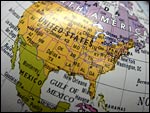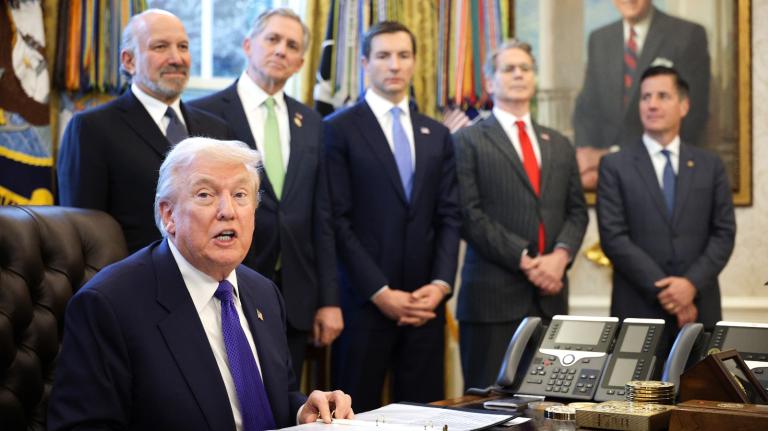
Nothing exemplifies the neoliberal policy consensus that dominates U.S. politics quite like NAFTA. The trade pact germinated under Bush I and flowered under Clinton/Gore. Bush II tends it like a conscientious gardener; he is even trying to harvest its seeds and plant them in Central America, hybridized as CAFTA. (There goes my garden-metaphor quota for the month.)
Nativist NAFTA critics like Pat Buchanan and anti-corporate opponents like Ralph Nader operate outside the mainstream. Rebuked as apostates by the major parties, they prove the rule: As divided as they are over the war, environmental policy, and other issues, political elites believe on faith that global trade must be promoted by public policy. Hillary Rodham Clinton and George W. Bush may not agree on much, but they converge on this point. (On the war, HRC’s major beef with GWB hinges on troop levels, but that’s another story.)
The heated debate in Congress over immigration, which gained new life last week when a bipartisan Senate deal collapsed, has touched very little on NAFTA — just as the question of God’s existence probably doesn’t figure much in Vatican fights over papal succession.
But the two issues are intimately related, for NAFTA stipulates that capital and goods must flow freely across the U.S.-Mexico border, while leaving policy about labor — i.e., people — to the pleasure of the respective national governments.
Environmentalists could intervene in the immigration battle by altering the terms of debate. But so far, they’ve been silent.
Right now, as Paul Krugman recently wrote in his NY Times column ($), the battle is being waged between Republicans who want to punish undocumented Mexican workers and Republicans who want to exploit them. (Ted Kennedy has largely been an ambassador between these two groups; the Democrats are marginalized.)
Eventually, the latter will win. I predict Kennedy will succeed in cobbling together a bill that preserves the contradictions of U.S. immigration policy: a militarized border, a guest-worker program that works for some employers, and a large disenfranchised army of undocumented workers.
The Senate remains the millionaire’s club, and abundant, undocumented Mexican labor has been very, very good to the millionaire set. As Robert Pollan shows in his excellent Contours of Descent, the economy has been able to maintain historically low unemployment and low inflation for about a decade now. Why does that matter? Typically, when unemployment falls, workers gain leverage and negotiate higher wages. Businesses pass those wage hikes onto consumers, sparking price inflation. Rising inflation cuts into the profits of the creditor classes, and the Federal Reserve typically intervenes, jacking up interest rates to slow the economy down, throwing workers out of jobs and putting downward pressure on wages.
In the last decade, though, businesses have been able to easily relocate overseas — to Mexico, and increasingly to China and India as well. Meanwhile, workers fleeing Mexico’s crumbling rural economy have been sneaking north, taking low-wage jobs in agriculture, food processing, restaurants, and textiles. The argument that “they’re taking jobs Americans don’t want” doesn’t tell the whole story. University of Virginia professor Barbara Ellen Smith, who studies labor issues in Appalachia, once told me that abundant labor at, say, the local slaughterhouse actually does put downward pressure on wages in an area. Such “jobs of last resort” had been a kind of safety net for area workers. Say you’re sick of your boss at Wal-Mart. Ten years ago, you might have done a stint at the slaughterhouse while waiting for a new job to come along. The very possibility you might do so may have been enough to get your boss back in line.
Now, however, the slaughterhouse is bustling with immigrant workers, and those jobs are gone. Illegal immigration has been a boon to Wal-Mart and its shareholders — and not just because the retail behemoth has itself exploited it.
Thus the global model embodied by NAFTA — capital and goods whip about freely, while workers are severely restricted and regulated — has led to rising corporate profitability and stagnating wages.
But it’s cruel and absurd to hate these workers, in the style of that unspeakable philistine, Lou Dobbs, whose vintage nativist rants threaten to sink CNN to the level of FOX. There’s a saying in Mexico that for every bushel of corn you dump on us, we’ll send you ten workers. The immigration boom is a legacy of the free-trade fervor that conquered the Mexican elite in the early 1980s, introduced at hammer’s head by an IMF that had taken the role of debt collector for New York banks. Disgraced former President Carlos Salinas swore he’d “modernize” the economy and cleanse the countryside of “unproductive” peasants. The U.S. investor class has reaped the benefits.
What, then, must we do? What can environmentalists add?
If we agree that a global economic system hinged on export and long-distance trade is energy-intensive, and that U.S. policy (and by extension, IMF, World Bank, and WTO policy) has for decades worked to subsidize and promote global trade, then a way forward comes into view.
An environmentalism that challenges this fundamental status quo has real potential to bolster sustainability. By developing and promoting local production for local consumption on both sides of the border, the U.S. economy can wean itself from its schizophrenic addiction to disenfranchised Mexican labor. And the Mexican economy can begin to work for its own citizens, not for the global investor class.
To do so means forging cross-border coalitions to challenge the assumption that state power exists to promote long-distance trade. One place to start: the 2007 Farm Bill, which Congress will soon take up. The bill will govern how the government subsidizes agriculture. Since the 1970s, the federal government has spent hundreds of billions of dollars rewarding bulk production of environmentally ruinous commodities like corn, which also threaten rural livelihoods in Mexico.
Let’s work to rewire federal farm policy to promote organic agriculture destined for nearby consumption. Ending the commodity-corn subsidy alone will instantly provide relief to beleaguered rural Mexicans now contemplating a hazardous trip north to a nation that both relies on and scorns them.



